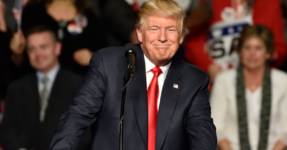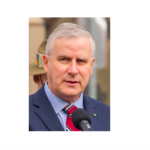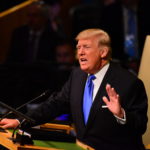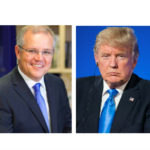Did Donald Trump Incite the Capitol Hill Riots?

In the aftermath of riots on the Capitol Building earlier this month, as a result of which five people died, former US President Donald Trump has been impeached.
Under the US Constitution, Congress has the authority to impeach and remove “The President, Vice President, and all civil officers of the United States” upon a determination that such officers have engaged in treason, bribery, or other high crimes and misdemeanours.
In the coming weeks, Donald Trump will face a hearing to determine whether he will be convicted of inciting an insurrection.
In order to understand why claims of voter fraud culminated in the riot on the Capitol Building, it is important to look at what Donald Trump said via rallies, mainstream media and social media platforms in the weeks leading up to riots themselves, as well as the way he governed America.
Divisive politics
There is no doubt that Donald Trump’s politics were divisive.
Throughout his presidency, rather than seek to unite Americans, he continually perpetuated discord via speeches and policies – for example, through his desire to build a wall on the US-Mexico border, his move to ban Muslim immigration, his removal of women’s rights via anti-abortion legislation, and calling Black Lives Matter protesters ‘thugs’ while refusing to denounce neo-nazi and other right wing protests.
Over time, Trump developed a strong following from members of the far-right, including the anti-immigrant, all-male group known as the Proud Boys, who have repeatedly been involved in violent street protests and were amongst those who broke into the US Capitol Building.
Trumps supporter base included militia groups, far-right media figures and Qanon supporters, who also partook in the raids.
Qanon-sense
Qanon has been described as a ‘disproven and discredited far-right conspiracy theory’ that President Trump is waging a secret war against elite Satan-worshipping paedophiles in government, business and the media.
It’s popularity grew rapidly after Trump described Qanon supporters as, “People who love our country” and people who “basically believe in good government.”
COVID
Trump has consistently demonstrated a unique ability to ignore facts. Never was this more evident than during the Covid-19 pandemic when for months he claimed the virus was under control and would soon be gone.
If I win I win, if I lose I was robbed
Long before the 2020 elections, he declared on a podium that “this would be the most rigged election in history;” a statement with no factual basis, but which set a serious undertone for what was to come.
On election night, 3 November 2020, he claimed a decisive victory when the result remained uncertain, and only hours after tweeted to his 88 million followers: “They are trying to steal the election.”
In the following days and weeks, Trump maintained the facade of his re-election at every public opportunity, refusing to acknowledge any other potential outcome, and when the time came to concede defeat, he refused to do so, instead tweeting: “He only won in the eyes of the FAKE NEWS MEDIA. I concede NOTHING! We have a long way to go. This was a RIGGED ELECTION!”
He went on to demand recounts, and launched dozens of legal challenges, every one of which was thrown out of the courts.
Many around the globe looked on, admiring Trump’s sheer optimism, considering it nothing more than a desperate last minute attempt to snatch victory from the jaws of defeat.
Fanning the flames
But in America, online and on the streets, conviction amongst his supporters was growing, based on the misguided notion that the election process had been rigged, an ‘illegitimate’ President was being installed into the White House, and Donald Trump and his supporters had been seriously wronged by the ‘system.’
The hashtag“#stopthesteal began taking off on social media. Early in November, a Facebook page with the same name emerged. Within 48 hours later, it had amassed more than 300,000 members. Many of the posts focused on unsubstantiated allegations of mass voter fraud, including claims that thousands of dead people had voted, and that counting machines had been rigged to flip votes from Mr Trump to Mr Biden. But some were also beginning to speak of ‘civil war’ or ‘revolution’.
Facebook quickly deleted the group, but not before it had attracted hundreds of thousands of comments and been shared as many times over. Even when it was deleted, various other groups sprang up in its place. .
The fervour of groundswell of support for retribution over Trump’s election loss continued to gain momentum. There have been reports of death threats and other acts of intimidation towards election officials and Democrat Party members in Georgia, Michigan and Arizona. Some of the rallies held in support of “Make American Great Again,” post-election, which were attended by thousands were marked by angry clashes with non-supporters.
Trump supporters genuinely seemed to believe that he had won a landslide victory, and that ‘unknown forces’ (they proposed several theories) were trying to take it from him.
‘[I]f you don’t fight like hell, you’re not going to have a country anymore.’
Then on 6 January 2021, just before the riots on Capitol Hill, Trump addressed a rally in Washington beginning with encouragement to “peacefully and patriotically make your voices heard”, and ending with: “We fight like hell, and if you don’t fight like hell, you’re not going to have a country anymore. “So we’re going to, we’re going to walk down Pennsylvania Avenue… and we’re going to the Capitol.”
In those words alone, Trump did not necessarily incite a riot. However, the question remains: Did he truly grasp the general mood of his supporters at that time and the potential impact of his words?
It should also be noted that it was not just Trump himself who promoted allegations of voter fraud, rigged counting and conspiracy theories, along with retaliation in some form or another.
Trumps’ personal lawyer, former mayor of New York Rudy Giuliani, was a leading proponent of the idea that the election had been rigged. addressed one rally saying: “If we’re wrong, we will be made fools of,” he said. “But if we’re right, a lot of them will go to jail. So let’s have trial by combat.”
One of Donald Trump’s sons made political threats to any Republican Congressman who certified Biden’s win.
Ted Cruz, a US senator from Texas told a rally: “We will not go quietly into the night. We will defend liberty. And we are going to win.”
Many prominent figureheads, including high profile actors and business people, supporters of Trump, also played along, each in their own way preserving and promoting claims via social media, of a rigged election, all of which eventually culminated in angry clashes with police, vandalism and violence on Capitol Hill.
Views expressed
Journalists, sociologists, psychologists, esteemed professors and analysts in the US have all expressed their views.
Many point out that while the riots can be linked to Trump’s repeated rhetoric, they all agree that there are existing complex social and race issues, some of which date back to a pre-Trump era, but which provided an environment in which Trump was able to garner fervent support, and create an exceptionally strong movement of people willing to incite violence in his name, which he has done nothing, in the aftermath to condemn.
Calls for calm, while continuing to claim victory
Even when compelled to call for calm after the riots, Trump still continued to claim ‘landslide victory that had been taken away.”
Investigation underway
The FBI has promised a full investigation into the conduct of both Trump and the actions of the rioters, as well as into assertions that Republicans may have assisted or encouraged rioters.
But the Bureau has been criticised for its ‘slow response’ and ‘failure to take proper action’ given that so much evidence exists – in news footage, in online chat forums, and of course within the social media accounts of the former President himself.
In the meantime, concerns continue to grow that the impeachment process itself may only add further fuel to the fire.






